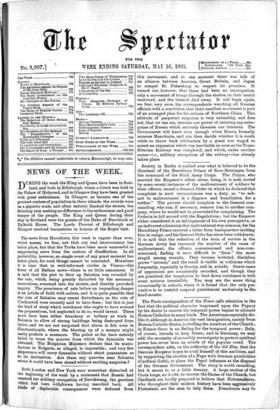Both London and New York were somewhat disturbed at the
beginning of the week by a statement that Russia had renewed her military occupation of Newchwang, the garrison which had been withdrawn having marched back. All kinds of deplorable consequences were deduced from this movement, and at one moment there was talk of an alliance between America, Great Britain, and Japan to compel St. Petersburg to respect its promises. It turned out, however, that there had been no reoccupation, only a movement of troops through the station on their march westward, and the turmoil died away. It will begin again, we fear, very soon, the correspondents watching all Russian officials with a conviction that their smallest movement is part of an arranged plan for the seizure of Northern China. This attitude of perpetual suspicion is very unhealthy, and does not, that we can see, increase our power of resisting any enter- prises of Russia which seriously threaten our interests. The Government will know soon enough when Russia formally annexes Manchuria, and can then decide whether it is worth while to throw back civilisation by a great war waged to arrest an expansion which was inevitable as soon as the Trans- Siberian Railway was completed, and which, under another name—i.e., military occupation of the railway—has already taken place










































